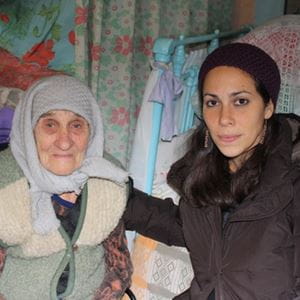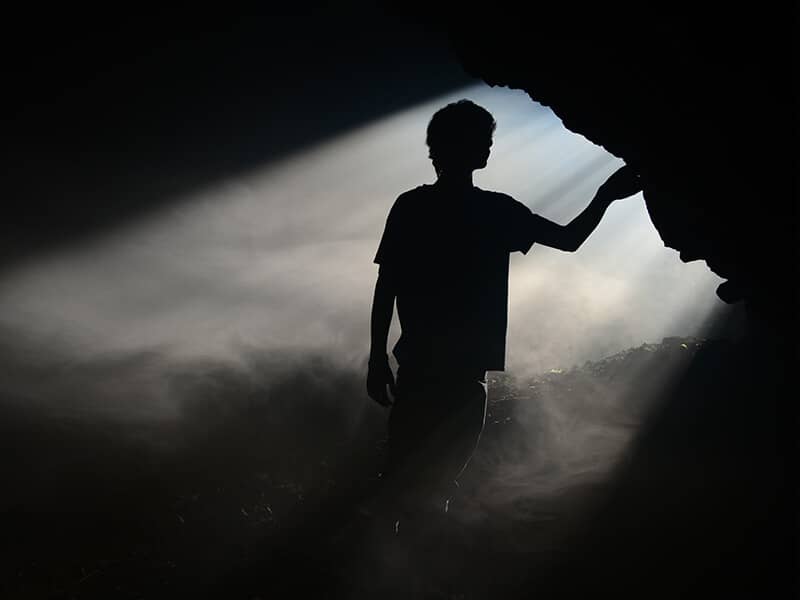
There are a few powerful words that describe Yael Eckstein, Senior Vice President of the International Fellowship of Christian and Jews: warm, inspiring, and passionate. She’s consumed with a love to unite Jews and Christians, help alleviate poverty and be a voice for Holocaust victims. The Fellowship’s Guardians of Israel is one of many projects dear to Yael, who has a social service background. IFCJ also works to help Jews make aliyah (or immigrate) back to the Holy Land through the Wings of Eagles program. This project brings Jewish people from places like Russia, Europe, and Ethiopia and from other parts of the world back to the homeland.
Yael, a mother of three, meets with the immigrants, and helps deliver life-saving supplies to children and the elderly under the threat of war on the Northern border. Rabbi Yechiel Eckstein, who founded IFCJ in 1983, pioneered the way for many other ministries trying to bridge the gap between Jews and Christians, now Yael is taking the next generation forward. It’s an ongoing battle, against poverty, prejudices and the threat of extinction from terrorist organizations, but Yael, like her father Rabbi Yechiel, aren’t easily deterred.
In what ways do you see God moving in Israel?
The Fellowship has over 400 projects here in Israel. So when I travel around to the Fellowship's projects I get to speak to the people, see the help that they're getting, and I come up with ideas of how the Fellowship can meet more and more needs here in the Holy Land. When I travel around to the Fellowship’s projects I get to see the Biblical prophecy come to fruition. I drive around and I see the lush forests, the produce that we’re growing here in Israel. We’re exporting produce, I can just hear God saying “The deserts will bloom [Isaiah 35:1].” And that’s exactly what happened. I go to the airport to greet flights for aliyah--flights that the Fellowship brought in from Russia, from Iran, from different Arab worlds, from Yemen—from all different places. [Isaiah 11:12] talks about how God: “will raise a banner for the nations and gather the exiles of Israel. He will assemble the scattered people of Judah from the four quarters of the earth”. We not only study the Bible here in Israel, we get to see it come alive.
What are the biggest challenges in ministering to the Jewish people in the Holy Land?
We’re having our 30th anniversary this year since my father Rabbi Eckstein started the Fellowship. It was the first Jewish Christian organization that tied together the Jewish and Christian faiths in shared respect, and shared values, communication and understanding. Before 30 years ago--the only thing that the Jewish people knew about the Christian community was what they read in history books. Thank God in the past 30 years we’ve come so far, so far in Jewish Christian relations in encouraging understanding and real respect...a real belief that we have shared values. And that if we work together to move forward with those shared values, that the world would be a better place. But there are still Jewish people here in Israel that won’t take the Fellowship’s life-saving aid because our donors are Christian. We’ve come very far in the last 30 years, but there is still more work to be done.
Why is there such a stigma?
I believe that once people understand what we’re doing [and] develop a real respect for one another, all those barriers and all those walls that have been built over hundreds and hundreds of years will start to break down.
Why is there so much poverty among the Jewish people, especially the elderly?
One-fourth of Holocaust survivors from Israel are poor. Many of those Holocaust survivors have seen their families die in gas chambers. They were taken by the Nazis and endured the worst atrocities known to man. Just last week I met with a woman named Katrina, a Holocaust survivor from Auschwitz and she has a number printed on her arm. Actually, she was telling me her sister had the same number but her number ended with a one and her sister’s ended with a two. Her sister was killed in the gas chamber; all of her family was killed except Katrina. And now Katrina lives in a little apartment underground, in a basement apartment on the Northern border of Israel. It was three days after she had hip surgery and didn’t have anybody to bring her meals. It was only the Fellowship that was bringing her food… What I still see over and over again is that they still call themselves the orphans. They have never gotten over the Holocaust. They live alone because they never had families because they were so traumatized. Help for the Holocaust survivor is needed more than ever. We want them to spend their final years with a little bit of dignity, hope and that [to feel that] they’re not alone… There are some bridges to cross. They look at it as the ‘Gentiles killed my family.’ And now it’s the Gentiles keeping them alive. Yes, poverty is very real in Israel and every day The Fellowship, with the help of our Christian friends abroad, is meeting the urgent needs of people like Katrina.
Can you tell us why you wrote the Seven Fruits of Israel devotional? What part of the book really encouraged you in your ministry?
I am taking the mundane task of cooking and making into a spiritual experience. The Seven Fruits of Israel represent the past, the current and the future of Israel. The cookbook part of it is just merging the spiritual, the physical, the mundane and the holy. I definitely look at studying about the seven fruits of Israel as a new learning experience for me in my personal journey of faith. I always try to learn more and get deeper in to biblical teachings. I don’t want to stay stagnant. If I’m not growing spiritually closer to God then I’m going further from him, then I’m going down. I always strive to grow closer to God. So this has been inspirational and encouraging process for me writing the Seven Fruits of Israel devotional as well as writing other books that I’ve been working on, because it’s my way of getting closer to God.
Check out the International Fellowship of Christian and Jews.

